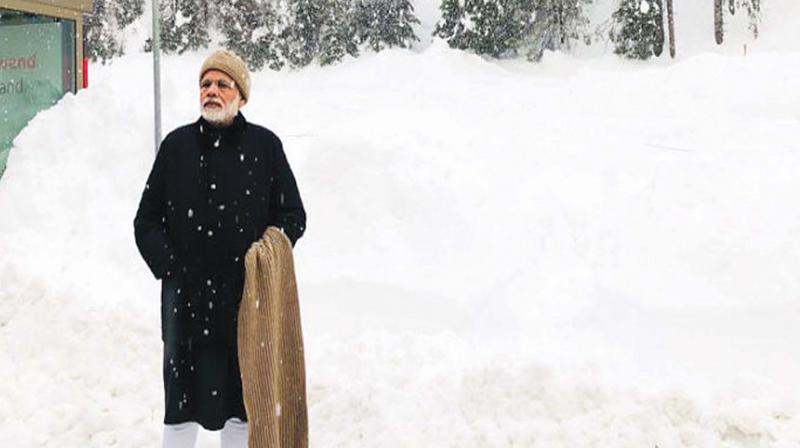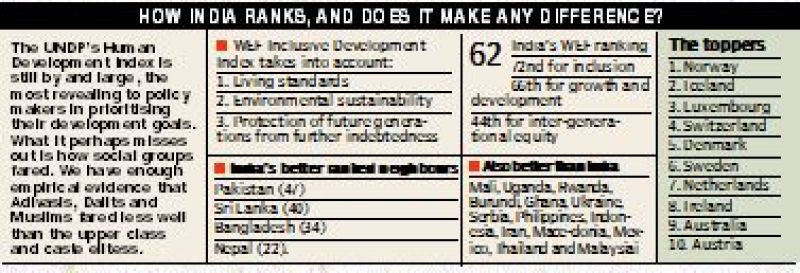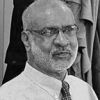Inclusive fallacy

Attainment of ranks is increasingly driving world development because of the obsession of policymakers with them. Recently, India was ranked at the 62nd place among emerging economies on the World Economic Forum’s (WEF) Inclusive Development Index, much below China’s 26th position and Pakistan’s 47th.
This resulted in a quite a bit of Modi bashing, considering the PM’s known penchant for attaining goals set up by vested interests. The index takes into account the “living standards, environmental sustainability and protection of future generations from further indebtedness”, the WEF said. It urged the leaders to urgently move to a new model of inclusive growth and development, saying reliance on GDP, as a measure of economic achievement is fuelling short-termism and inequality.
Of the three pillars that make up the index, India ranks 72nd for inclusion, 66th for growth and development and 44th for inter-generational equity.
The neighbouring countries ranked above India include Pakistan (47), Sri Lanka (40), Bangladesh (34) and Nepal (22). The credibility of this report is amply evidenced by the fact it shows Nepal, one of the world’s poorest countries and among the lowest placed in the UNDP’s Human Development Index, as better off than Sri Lanka, whose HDI is on par with that of China and the most developed Indian state, Kerala.
The countries ranked better than India also include Mali, Uganda, Rwanda, Burundi, Ghana, Ukraine, Serbia, Philippines, Indonesia, Iran, Macedonia, Mexico, Thailand and Malaysia. We know about the inclusiveness policies of countries like Uganda, Rwanda, Ukraine and Serbia, whose paroxysms of ethnic cleansing should be too recent to forget.
The WEF’s appropriation of the term “inclusiveness” gives it an entirely different meaning. This is another method of giving typically self-serving indexes a societal value. The profile of participants at the recent WEF Davos conference tells a great deal about its success in pushing its “rich must get richer” agenda.
On the eve of the Davos conference Oxfam released a study that showed that eight men in that conference own the same wealth as the 3.6 billion people who make up the poorest half of humanity. We now know that 73 per cent of the GDP gains made in decades after “liberalisation” accrued to the top 1 per cent. The Oxfam study also showed that between 1988 and 2011 the incomes of the poorest 10 per cent increased by just $65 per person, while the incomes of the richest 1 per cent grew by $11,800 per person – 182 times as much.
World GDP has been growing at record pace in the era of Globalisation. To somewhat mitigate the revulsion caused by the uneven accretion of wealth, the WEF has made a mild attempt to show that it has other concerns than just economic growth. It now, among its other agenda items, espouses “inclusiveness”. But its inclusiveness is essentially about economic inclusiveness and not social inclusiveness. It now states that “decades of prioritising economic growth over social equity has led to historically high levels of wealth and income inequality and caused governments to miss out on a virtuous circle in which growth is strengthened by being shared more widely and generated without unduly straining the environment or burdening future generations. Excessive reliance by economists and policymakers on Gross Domestic Product as the primary metric of national economic performance is part of the problem”.
The so called reform agenda is usually determined by international organisations with agendas of their own.
The usual technique is to derive Indexes of ranking and make countries and institutions strive for that. We hence must always seek the organisation behind the Index. Take the case of the Economic Freedom Index, the classification of which earned Bibek Debroy, then employed by the Rajiv Gandhi Foundation, the eternal goodwill of the then Gujarat Chief Minister, Narendra Modi. At that time I had written that this index was like classifying policemen by the condition of their uniforms rather than their record on maintaining law and order, and conviction record.
The notion of “Economic Freedom” traces its origins to a series of seminars between 1986-’94 sponsored by the Fraser Institute of Canada and hosted by Milton and Rose Friedman. Milton Friedman is a Nobel Prize winner in economics and his brand of economics stands at the most rightward fringe of the spectrum. His policy preferences have been criticised by a galaxy of economists, including John Galbraith and Amartya Sen, as insensitive to people. On that count at least the EFI of Mr Debroy was accurate. Narendra Modi’s sensitiveness to certain sections of society is well known and evidenced by his apathy towards them.
Like the Fraser Institute that has a “reforms agenda” of its own to push, the World Economic Forum too has its single-minded reforms agenda to peddle. Contrary to what most people think, the WEF is a private NGO started by a German, Klaus Schwab and his wife, Hilde, in 1971 as the European Management Forum which became the WEF in 1987. Like in the case of most such NGOs, it’s based on a business opportunity. In WEF's case it was to push Globalisation, which for most part means pushing MNC interests. European corporations like ABB were its early financial backers.
Today its 1,000 member companies, typically global enterprises with more than five billion dollars in turnover and hence mostly western MNCs, fund the WEF. The nature of the WEF agenda should be clear by this.
Therefore, to my mind, the quality of their intellectual integrity should be about par with the Coca Cola Corporation funding a study by a Harvard professor on the many benefits of sugar consumption, or the Tobacco Institute of India’s studies casting doubts on various health studies linking tobacco consumption with cancer and heart diseases.
There have been important voices warning about the integrity of the WEF agenda, such as Dr Steven Strauss, a well known American business person, public sector executive, OpEd columnist and academic. He is currently the John L. Weinberg/Goldman Sachs & Co visiting professor at Princeton University since 2014.
Mr Strauss, then at Harvard’s Kennedy School of Government, had raised an additional concern, pointing out that many of the WEF’s strategic partners (who in return for financing the annual meeting have the ability to set the intellectual agenda for the meeting) have been convicted of serious criminal, civil, or human rights violations, raising significant issues about the forum’s legitimacy as a neutral convener on certain topics.
(The writer, a policy analyst studying economic and security issues, held senior positions in government and industry. He also specialises in the Chinese economy.)
Ranks

